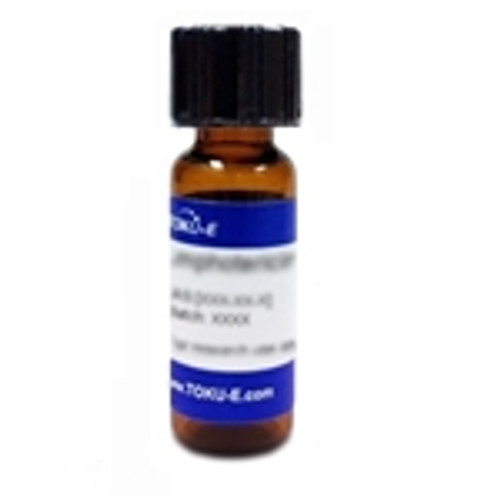Toxoflavin (PKF 118-310) is an azapteridine antibiotic produced by some species of Pseudomonas, Streptomyces, and Burkholderia gladioli that has antibiotic and anticancer properties. It is also a yellow pigment that acts as a pH indicator changing between yellow and colorless at a pH of 10.5. Toxoflavin is one of two toxins produced when a fermented coconut drink, Tempe bonkrek, is contaminated with P. cocovenenans.
Toxoflavin is toxic because it acts as an electron carrier, resulting in the production of hydrogen peroxide.
Toxoflavin (PKF 118-310) is a potent antagonist of Tcf4/b-catenin signaling, inhibiting the expression of survivin and inducing apoptosis in several tumor cell lines. It also has been shown to inhibit KDM4A and SIRT1/2 which show promise as anticancer targets.
Toxoflavin can be used in potato cell transformation, as a selection agent, with similar efficacy as the hygromycin/hpt selection system.
Toxoflavin is soluble in ethanol, methanol, DMF and DMSO.
| Mechanism of Action | Toxoflavin (PKF 118-310) is toxic because it acts as an electron carrier, facilitating cytochrome-independent electron transfer, resulting in the production of hydrogen peroxide during glycolysis and the citric acid cycle. When NADH is combined with toxoflavin in a yeast cell extract, electrons are transferred from NADH to toxoflavin. Toxoflavin (PKF 118-310) then transfers these electrons to oxygen, producing hydrogen peroxide. It is predicted that the toxic effect of toxoflavin (PKF 118-310) is due to the action of hydrogen peroxide and not due to interference with the electron transport chain. Yeast cells, which exhibit high catalase activity, do not show similar growth defects in the presence of toxoflavin. Even though the yeast electron transport system is altered by toxoflavin (PKF 118-310), the abundance of catalase can neutralize the excess hydrogen peroxide produced, thus preventing cellular toxicity. |
| Spectrum | Toxoflavin (PKF 118-310) is toxic to plants, fungi, animals and microorganisms. |
| Microbiology Applications |
Compounds related to Toxoflavin (PKF 118-310) were identified as potent antivirals, inhibiting Hepetitis C Virus RNA-dependent RNA polymerase. Their use has been limited by the toxicity of the compounds. |
| Plant Biology Applications |
Toxoflavin (PKF 118-310) has been used as an effective selection agent for potato transformation, using toxoflavin lyase (tflA) as the selectable marker gene. Potato plants expressing tflA was successfully transformed on Toxoflavin medium with 27% efficiency, similar to that for the hygromycin/hpt selection system. The transgenic potato expressing tflA also showed resistance to Burkholderia glumea infection. Burkholderia gladioli is a causal agent of bacterial panicle blight and sheath/grain browning in rice in many countries. Many strains produce the yellow pigment toxoflavin, which is highly toxic to plants, fungi, animals and microorganisms.
|
| Cancer Applications |
Toxoflavin (PKF118-310) inhibits expression of survivin and induces apoptosis in HCC, colon tumor and lymphocytic leukemia cell lines. Toxoflavin (PKF 118-310) has been shown to inhibit Lysine-specific Demethylase 4A (KDM4A), that functions as a trimethylation-specific demethylase, converting specific trimethylated histone on histone H3 lysine 9 and 36 residues to the dimethylated form and lysine 9 dimethylated residues to monomethyl, and as a transcriptional repressor. Alteration in the KDM4A gene have been found to be associated with chromosomal instability that leads to cancer. Toxoflavin (PKF 118-310) is a potent SIRT1/2 inhibitor. SIRT1 and SIRT2 are deacetylase enzymes that belong to the sirtuin family and are involved in tumorigenesis. Toxoflavin exhibited growth inhibition of various cancer cell lines including A549 lung cancer cells with a GI50 of 48 nM. Toxoflavin treatment in A549 cells increased the acetylated form of p53, which is a substrate of SIRT1. The acetylation levels of α-tubulin, a SIRT2 substrate, were also increased by toxoflavin treatment dose-dependently. |
| Molecular Formula | C7H7N5O2 |
| References | Levenberg B and Linton SN (1966) On the biosynthesis of Toxoflavin, an azapteridine antibiotic produced by Pseudomonas cocovenenans. J. Biol. Chem. 241:846 Wei W et al (2010) Small molecule antagonists of Tcf4/beta-catenin complex inhibit the growth of HCC cells in vitro and in vivo. Int. J. Cancer 126:2426 Lepourcelet M et al (2004) Small-molecule antagonists of the oncogenic Tcf/beta-catenin protein complex. Cancer Cell 5:91 |



